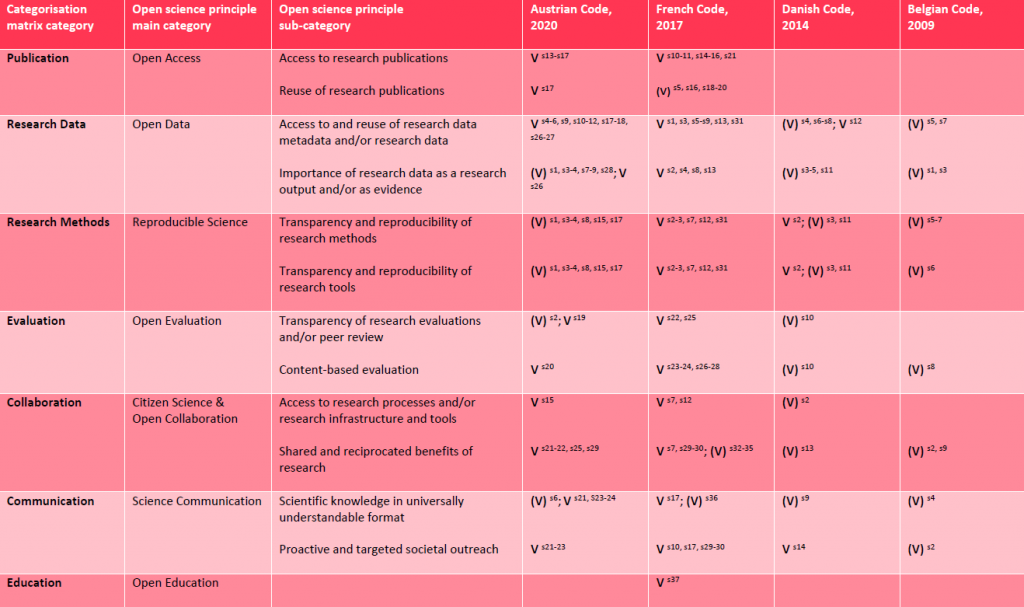The relationship between Research Integrity, Research Ethics perspective and Open Science
Presenting the tensions, challenges, overlaps between research integrity, the wider research ethics perspective and open science.
The effortless alignment of research integrity (RI) and open science (OS) in terms of their objectives is by no means obvious. Therefore, it is essential to analyse the cross-cutting issues within the two areas in order to conceptualize both within an integrated perspective. How the official RI codes in different European countries approach OS ideas is the main question of the present article. Additionally, the article examines tensions, challenges and overlaps between RI, the wider RE perspective and OS. The publication of European Code of Conduct for Research Integrity, ECoC (in 2017) and the implementation of OS policies in Europe (after 2019) make the present study timely.
The following table gathers the information from the analysis of two independent researchers and discloses the consensus obtained. Some facts are worth highlighting: the responsible research scope is quite divergent in the different documents: 1) research integrity is included in all; 2) research ethics and open science were found only in Austrian and French codes; 3) open education explicitly mention only the French code. Legent to the symbols: V if the sub-category clearly applies; (V) if the sub-category somehow applies. An additional mark was considered, V, meaning something found that may be divergent with OS principles.

Codes of conduct can be framed within the idea of responsibility. The concept is multiple in the sense that we can consider several dimensions: the legal, the social, the moral, the professional, the political, and the historical. Moreover, responsibility could be understood at different levels – individual, institutional and societal – and in diverse contexts – “to assume responsibility”, “to attribute responsibility”, “to have responsibility” or, in a normative meaning, “to be a responsible person” (Teixeira, Carvalho, & Pereira, 2018).[1]
In the scope of ethics in research, responsibility is a key aspect and codes of conduct – normative, conveying rules with which researchers and research institutions ought to comply – are deemed to clarify the meaning of responsible research and of responsible person/institution. Codes have been described as normative also in a more specific sense of attributing responsibility to particular actors (Valkenburg et al., 2020),[2] even though the articulation of different levels of responsibility (individual or institutional) might not be clear (ibid).
Mainly from our results regarding the analysis of different EU national codes of conduct regarding research integrity, some notes are due:
1. The layers of confusion surrounding responsible research rival a millefeuille. Responsibility in research is spread across so many areas (research ethics, research integrity, open science, responsible research and innovation, science communication) that it is difficult to define what a responsible investigator is;
2. Also, as far as we were able to assess with our results, these areas are usually treated independently; for the corpus of the analysis only in the Austrian and the French codes do these issues have been treated within the same document.
Notes
[1] Teixeira, C. M., Carvalho, A. S., & Pereira, S. M. (2018). Responsibility: From its conceptual foundations to its practical application in intensive care units. Acta Bioethica, 24(1), 47-56. http://dx.doi.org/10.4067/S1726-569X2018000100047
[2] Valkenburg, G., Dix, G., Tijdink, J. et al. (2020) Making researchers responsible: attributions of responsibility and ambiguous notions of culture in research codes of conduct. BMC Medical Ethics 21, 56. https://doi.org/10.1186/s12910-020-00496-0
This passage is part of D1.1: Report on the relationship (tensions, challenges, overlaps) between RI, the wider RE perspective and OS written by Ana Sofia Carvalho & Maria Strecht Almeida.